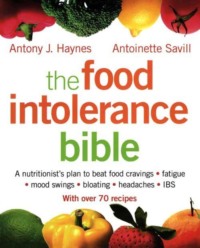
The Food Intolerance Bible: A nutritionist's plan to beat food cravings, fatigue, mood swings, bloating, headaches and IBS
This was a truly staggering result, and not something I could have predicted. The good news was that no other system in her body had reached a state of exhaustion so that it took only the avoidance of the culprit food to help Sally return to a good state of health. It was also fortunate that she evidently only had one major culprit food. To think that she could have been put on antidepressants, which would not have solved the problem, of course. I wonder how many others with cognitive and mood disorders would benefit from looking at their diets as a source of their symptoms. It is well known, for example, that a large percentage of people who suffer from coeliac disease also suffer from bipolar disorder (schizophrenia).
Brain Allergy
Food intolerances can certainly affect the brain. Dr William Philpott, a psychiatrist and an author of a noteworthy book entitled Brain Allergies, has reported that intolerant reactions to foods and pollutants often trigger violent behaviour. One of his 12-year-old patients became so aggressive after eating a banana that he picked up a stick and tried to hit another patient.
Temper Tantrums
Nearly 40 years ago, Professor of Psychology Dr Moyer wrote how a 5-year-old boy with poor speech development had an abnormal EEG (brain scan showing abnormal brainwave patterns) and a temper that was out of control. The boy was found to be intolerant to chocolate, milk and cola, which were then eliminated from his diet for over seven months. The EEG was repeated and found to be normal, and his behaviour was much improved. When the culprit foods were then reintroduced, his EEG was once again abnormal and his behaviour worsened.
Study into Nervous System Complaints
Two doctors, King and Mandell, conducted a double-blind study of 30 patients in 1978 to test 12 allergens (allergy-inducing triggers) and 6 placebos. The patients reported significantly more nervous system complaints when they were exposed to the allergens compared with the placebos. These included depression, an inability to concentrate, anger, irritability and headaches. Other double-blind studies have confirmed the definite effects of foods on behaviour.
Diet, Crime and Delinquency
Alexander Schauss was the Director of the American Institute for Biosocial Research when he wrote his book Diet, Crime and Delinquency in 1980. This slim, 108-page volume presents startling evidence that what we eat can have a significant impact on our potential to commit crimes and misbehave. The book is not just about food intolerance, however, but also refers to sugar, toxic metals such as lead, food additives, nutrient insufficiencies, lack of exercise and lack of proper exposure to light.
Summary
Food intolerance has been documented for thousands of years, although it is increasing day by day and is much more prevalent today than ever before. Food intolerance has been well proven to contribute to and even cause the symptoms of IBS, but it can also cause a wide range of other symptoms, especially those that relate to brain function.
This book is designed to help you to identify whether you have an intolerance, and what this might be doing to you, why you might have intolerances in the first place, and what action you can take to address the situation in order to improve your health.

Конец ознакомительного фрагмента.
Текст предоставлен ООО «ЛитРес».
Прочитайте эту книгу целиком, купив полную легальную версию на ЛитРес.
Безопасно оплатить книгу можно банковской картой Visa, MasterCard, Maestro, со счета мобильного телефона, с платежного терминала, в салоне МТС или Связной, через PayPal, WebMoney, Яндекс.Деньги, QIWI Кошелек, бонусными картами или другим удобным Вам способом.
Вы ознакомились с фрагментом книги.
Для бесплатного чтения открыта только часть текста.
Приобретайте полный текст книги у нашего партнера:
Полная версия книгиВсего 10 форматов

